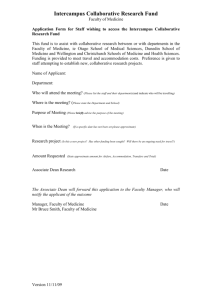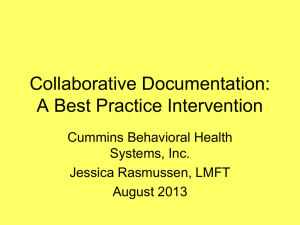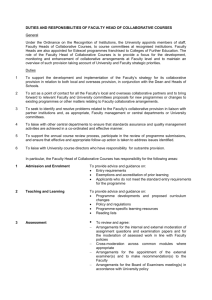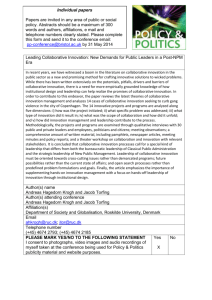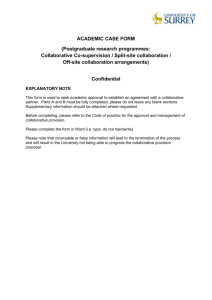Collaborative Programmes – quality assurance arrangements
advertisement
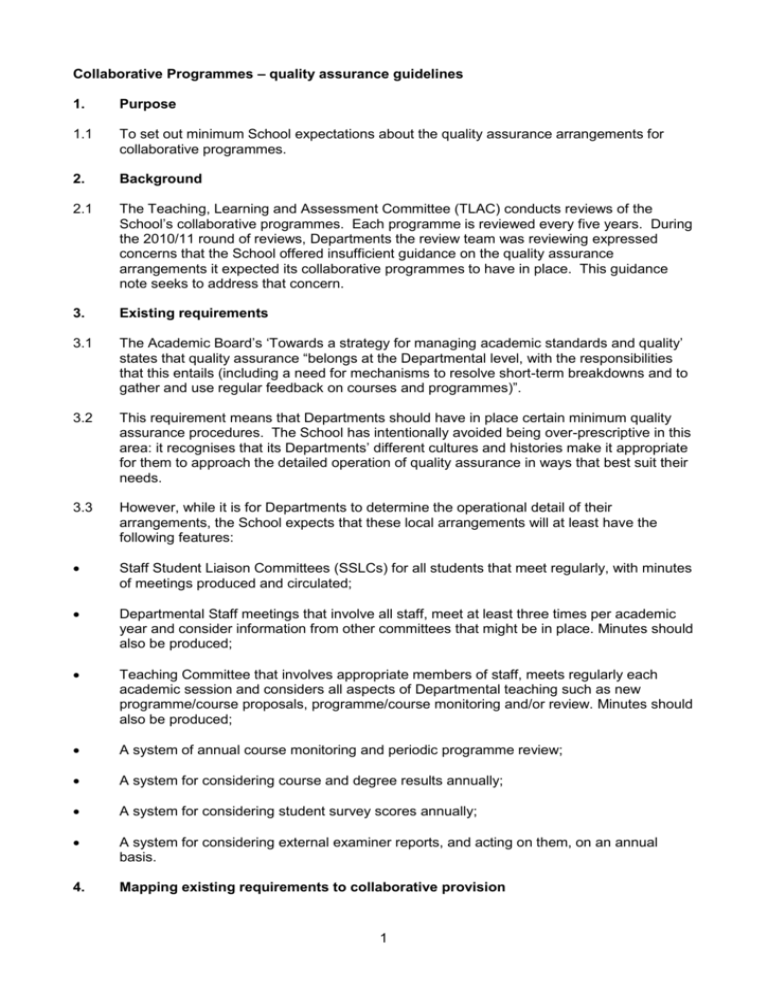
Collaborative Programmes – quality assurance guidelines 1. Purpose 1.1 To set out minimum School expectations about the quality assurance arrangements for collaborative programmes. 2. Background 2.1 The Teaching, Learning and Assessment Committee (TLAC) conducts reviews of the School’s collaborative programmes. Each programme is reviewed every five years. During the 2010/11 round of reviews, Departments the review team was reviewing expressed concerns that the School offered insufficient guidance on the quality assurance arrangements it expected its collaborative programmes to have in place. This guidance note seeks to address that concern. 3. Existing requirements 3.1 The Academic Board’s ‘Towards a strategy for managing academic standards and quality’ states that quality assurance “belongs at the Departmental level, with the responsibilities that this entails (including a need for mechanisms to resolve short-term breakdowns and to gather and use regular feedback on courses and programmes)”. 3.2 This requirement means that Departments should have in place certain minimum quality assurance procedures. The School has intentionally avoided being over-prescriptive in this area: it recognises that its Departments’ different cultures and histories make it appropriate for them to approach the detailed operation of quality assurance in ways that best suit their needs. 3.3 However, while it is for Departments to determine the operational detail of their arrangements, the School expects that these local arrangements will at least have the following features: Staff Student Liaison Committees (SSLCs) for all students that meet regularly, with minutes of meetings produced and circulated; Departmental Staff meetings that involve all staff, meet at least three times per academic year and consider information from other committees that might be in place. Minutes should also be produced; Teaching Committee that involves appropriate members of staff, meets regularly each academic session and considers all aspects of Departmental teaching such as new programme/course proposals, programme/course monitoring and/or review. Minutes should also be produced; A system of annual course monitoring and periodic programme review; A system for considering course and degree results annually; A system for considering student survey scores annually; A system for considering external examiner reports, and acting on them, on an annual basis. 4. Mapping existing requirements to collaborative provision 1 4.1 Departmental quality assurance arrangements should be applied – flexibly and proportionately where appropriate – to collaborative provision. This will ensure equivalent quality and academic standards across collaborative and core provision; and that collaborative programme issues are not dealt with in isolation. For example, a Department will normally consider the external examiner reports and performance data relating to courses that contribute to a collaborative programme by the same procedure and at the same time as it considers its other provision. 4.2 The bullet points below suggest how existing Departmental quality assurance arrangements can be applied to collaborative programmes. The programme will have its own SSLC, or will nominate a student representative, or representatives, to attend the appropriate SSLC within the Department; The Programme Director will attend Departmental staff meetings, and represent the interests and concerns of the programme as appropriate; The Programme Director or a deputy will attend Teaching Committee meetings (or keep informed about its activity) to note whether proposed amendment or enhancement to courses contributing to the collaborative programme might affect the programme’s aims, delivery or learning outcomes; or whether changes in course content might affect the intellectual complementarity between the ‘LSE year’ and the year at the partner institution; In line with the School’s main taught provision, a Department will review its collaborative programmes every three to five years, and annually monitor the courses that contribute to the programme (i.e. those courses that fall under its purview). Annual monitoring of the programme will be based on the review and analysis of a range of data, such as student feedback (e.g. from the SSLC); student progression and performance (i.e. collaborative student performance versus ‘LSE only’ student performance); external examiner reports and responses to them; minutes of the Joint Programme Committee meetings (see section 5, below); graduate destination data, etc. The precise data set used in annual monitoring is to be determined by the Department at its discretion. Annual monitoring should also include a review of the information made available to students about the programme by both institutions, e.g. about the aims of the programme; the academic complementarity – and differences – between years one and two; the different academic cultures, traditions and approaches at each institution; course availability; student support; accommodation; etc. The Department will also conduct deeper periodic reviews of the programme (i.e. every three to five years, analysing the information above on a cumulative basis, and in light of developments in the discipline). The aim will be to determine the continuing validity and currency of the programme; and the continuing effectiveness of the curriculum and assessment in relation to learning outcomes. The Joint Programme Committees (JPCs) will be responsible for overseeing this monitoring and review activity, not least in determining the boundaries of different components of monitoring and review (e.g. external examiner reports would apply to the LSE year only, but student performance data and student feedback could apply across the programme as a whole). The JPC will report its findings annually to the academic Departments responsible for the programme at each institution. Departments will normally consider the course results for students on collaborative programmes alongside the results for ‘LSE only’ students on the same courses, e.g. at the relevant sub-board of examiners meeting, Departmental Staff meeting, Teaching Committee meeting or special body appointed for the purpose. The Joint Programme 2 Committee will also annually consider collaborative programme results. The aim here is to identify any disparity in performance between students on the collaborative programme and students on the Department’s other programmes; to consider if steps are necessary to address any disparity; to consider (in the case of double degrees) whether the programme is providing ‘value added’, i.e. is something more than two one-year programmes running concurrently; and to report these findings and any proposals to the Department. The Department’s procedure for considering annual survey scores will identify any instances of anomalous scores on shared courses (i.e. where collaborative programme students and ‘LSE only’ programme students sit the same courses), as set against the Departments ‘LSE only’ courses. For example, if courses taken by both collaborative programme and ‘LSE only’ students achieve significantly higher/lower survey scores than courses taken by ‘LSE only’ students, the Department – through the JPC – should consider the possible causes. Such scores will only signal the need for further investigation, and will not of themselves indicate that there are problems with the course. The JPC will consider relevant external examiner reports. 5. Joint Programme Committee 5.1 Every collaborative programme at the School is underpinned by a written agreement and set of operational procedures. These set out the School’s and its partners’ mutual obligations. All written agreements require the programme in question to put in place a Joint Programme Committee. 5.2 A Joint Programme Committee is the only additional quality assurance mechanism for collaborative programmes. It is the body responsible for overseeing most of the quality assurance arrangements for the programme (e.g. monitoring and review; consideration of student feedback and performance data, etc). 5.3 The membership of the JPC should include at least two representatives from both (all) partnership institutions, including each institution’s Programme Director and the relevant Head of Departments or equivalent. Others – such as Masters’ Students Tutor or equivalent, Course Managers (i.e. academics responsible for indic, and other relevant contributors to the programme – may be called upon by the Committee for their support as and when necessary. The exact membership is a matter for the Department and its partner(s) to determine. 5.4 Likewise, it is for the JPC to determine its own terms of reference, as best supports the management and delivery of the programme. Sample JPC terms of reference might include: - To oversee and assure the academic standards and content of the programme; To oversee the programme’s compliance with each institutions’ regulations on behalf of the relevant academic Departments, to which the JPC is accountable; To assure the accuracy of published programme information, and to monitor and revise that information as necessary; To consider course and programme results, including in respect of progression between years 1 and 2, and pass (including by class) and failure rates; To ensure that student feedback is solicited annually, and to consider and – where necessary – to act on it; To monitor annually the student experience of the programme and its courses during the previous year and – where necessary – propose changes to them; To review annually the Operational Procedures in consultation with appropriate academic and administrative colleagues at both Institutions and agree changes to them in order to ensure the smooth running of the Programme; 3 - 5.5 To update and agree annually the lists of the courses to be available at each Institution in the next academic year. These lists will appear on the official website(s) for the Programme. Day-to-day management of the programme is normally delegated to the Programme Directors. Delegated responsibilities can include: assessing applications and determining admission; reviewing student progression and performance; considering and proposing programme amendments (including course modifications and new course options) to the JPC, for onward transmittal to the Department and – where necessary – to the appropriate institutional bodies; reviewing programme-specific survey results; and agreeing and updating published information about the programme. Summary reports of delegated activity should be made to formal JPC meetings. TQARO and APU October 2011 4



